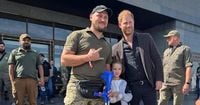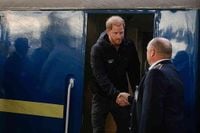Britain’s Prince Harry has once again found himself in the global spotlight, making a surprise visit to Kyiv, Ukraine, on September 12, 2025, in a show of solidarity with wounded servicemen and the Ukrainian people as they endure the ongoing conflict with Russia. This unexpected appearance, confirmed by his representatives to The Associated Press, marks Harry’s second visit to Ukraine since Russia’s full-scale invasion began in 2022, underscoring his commitment to supporting veterans and raising awareness for those affected by war.
The prince’s journey to Kyiv was the culmination of a whirlwind week that saw him reconciling with his estranged father, King Charles III, and reigniting his public image after years of controversy and personal struggle. According to The Guardian, Harry traveled to Ukraine by overnight train, accompanied by his team from the Invictus Games—a Paralympic-style event he founded to inspire wounded veterans. Reflecting on the purpose of his trip, Harry told The Guardian, “We cannot stop the war but what we can do is do everything we can to help the recovery process.” He added, “We have to keep it in the forefront of people’s minds. I hope this trip will help to bring it home to people because it’s easy to become desensitised to what has been going on.”
Harry’s visit came just days after Russia launched its largest aerial assault on Ukraine since the start of the invasion, with attacks striking key government buildings and causing widespread devastation. The timing of his arrival, less than a week after this escalation, lent his presence a particular poignancy. As Kyiv’s military chief Tymur Tkachenko wrote on Telegram, “Buildings destroyed to rubble are a universal language. Our pain also needs no translation. And standing shoulder to shoulder with us, sharing our grief, are Ukraine’s partners and friends. We are grateful to Prince Harry for his attention to our suffering, for his sincere compassion.”
The prince’s itinerary in Kyiv was kept tightly under wraps for security reasons, but key details have since emerged. Harry visited the National Museum of the History of Ukraine in the Second World War, where he spent time with 200 veterans and joined a panel discussion. Drawing from his own experience as a British Army veteran who served in Afghanistan, Harry offered words of encouragement: “You will feel lost at times, like you lack purpose, but however dark those days are, there is light at the end of the tunnel. You just need to look for it, because there will always be someone—a mother, father, sibling, friend, or comrade—there to pick you up.”
During his stay, Harry also met Ukrainian Prime Minister Yulia Svyrydenko and paid his respects at the site of a recent Russian attack. The visit coincided with a trip by British Foreign Secretary Yvette Cooper, who announced a new set of UK sanctions targeting Russia’s oil revenues and military supplies. Cooper emphasized that her visit, like Harry’s, was a demonstration of unwavering support for Ukrainians facing intensified assaults, including a staggering 6,500 drones and missiles launched in July alone—ten times the number from a year prior.
Harry’s engagement with Ukraine’s veterans and ongoing war recovery efforts is not new. Earlier this year, in April, he traveled to the western city of Lviv to visit the Superhumans Center, an orthopedic clinic that provides prosthetic limbs, reconstructive surgery, and psychological support free of charge to wounded soldiers and civilians. His foundation, Archewell, established with his wife Meghan Markle, announced this week a $500,000 donation to projects supporting injured children from both Gaza and Ukraine. The funds are earmarked for the World Health Organization’s medical evacuation efforts and for developing advanced prosthetics for seriously injured young people.
The impact of Harry’s visit was immediate and far-reaching. On September 13, Ukraine’s government announced its ambition to one day host the Invictus Games, inspired by Harry’s advocacy and the global attention his visit brought to the country’s resilience. As the founder of the Invictus Games, Harry’s presence in Kyiv was both symbolic and practical, reinforcing Ukraine’s bid to host the event in 2029. According to AFP, Ukrainian officials expressed hope that the international spotlight could accelerate their recovery and integration into the global community of veterans and athletes.
Prince Harry’s journey to Ukraine followed a significant personal milestone: a reunion with his father, King Charles III, in London. After landing at Heathrow Airport on September 8, Harry paid his respects at St George’s Chapel, Windsor Castle, marking three years since the death of his grandmother, Queen Elizabeth II. He then attended the 20th anniversary WellChild awards ceremony, a charity supporting seriously ill children, where he spoke warmly about the organization’s mission and his own experiences as a father. “The charity has become even more meaningful to me since becoming a father,” he told Hello!, highlighting plans to expand support for parents of sick children.
The following days saw Harry engaging with various charitable initiatives. On September 9, he visited the Community Recording Studio in Nottingham, a project aiding children affected by violence, and made a personal donation of £1.1 million. He praised a young rapper named Paige, telling her, “You gave me goosebumps,” after watching her performance. On September 10, Harry visited the Centre for Blast Injury Studies at Imperial College London, donating $150,000 to the program, $200,000 to the World Health Organization for medical evacuations from Gaza, and $150,000 to Save the Children to support humanitarian work in the region.
Perhaps most notably, Harry met with King Charles III at Clarence House for a 52-minute meeting—their first encounter in 19 months. The meeting, described by BBC as a “first step in repairing frigid relations,” came after years of public estrangement following Harry and Meghan’s decision to step back from royal duties in 2020 and move to California. Harry has faced his share of legal battles and media scrutiny, but his recent actions have signaled a desire to reconnect with his family and homeland. When asked about the meeting, Harry simply told reporters, “Yes, he’s great, thank you.”
While relations with his brother, Prince William, remain strained, Harry’s efforts to support veterans and those affected by conflict have resonated with many. His visit to the Diana Award event in London on September 11, where he discussed the mental health impacts of social media on young people, further underscored his ongoing commitment to humanitarian causes.
As the dust settles on Prince Harry’s comeback tour, his renewed focus on service and reconciliation has begun to shift public perception. Whether his efforts will lead to lasting change—both within his family and for the causes he champions—remains to be seen. But for now, Harry’s actions in Ukraine have sent a powerful message: even amid turmoil and division, compassion and solidarity can still make headlines.



